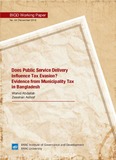| dc.description.abstract | This paper examines the role of access to public services on tax evasion. Establishing such a link directly (for both the citizens and researchers at the micro-level) is difficult because the tax collecting authority (Finance) and the service delivery authority (e.g., Utility Services) are often different, and there are numerous services, different, administratively, qualitatively and spatially, financed from the same revenue pool. The case of municipality taxation and municipality services could be an exception since the tax collecting authority and the service delivery authority are the same. With this belief, we investigate the role of service delivery in tax evasion using a citizens’ survey conducted by BRAC Institute of Governance and Development (BIGD) in 2014. The survey collected information of citizens from 286 municipalities in Bangladesh (out of 321 municipalities and 11 large city corporations) who report their access to municipality services, details of their property holdings and municipality taxes they pay. We use details of holding properties and other citizen information to estimate the municipality tax liability of each citizen and then compare that with the actual tax payments to estimate the municipality tax evasion. The access to public services and tax evasion however are endogenously determined since greater tax evasion results in lower tax revenue, lower revenue expenditure and hence, poorer service delivery. Hence, we instrument for access to services with a regulatory intervention that has caused a rapid municipalization of urban settlements seventeen years ago, more than doubling the number of municipalities in subsequent five years. This has made significantly fewer funds available to each municipality, slowing down the infrastructural set-up and eventually poorer access to services even in 2014. We believe that this regulatory intervention is related to individual willingness to pay taxes only through access to services and tax rate, which we control for. We find that citizens with greater access to services evade less. Furthermore, in line with the literature, higher municipality tax rates are positively associated with greater tax evasion. | en_US |

